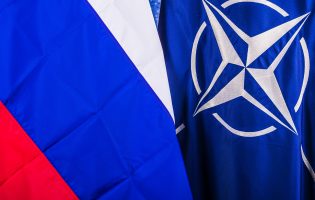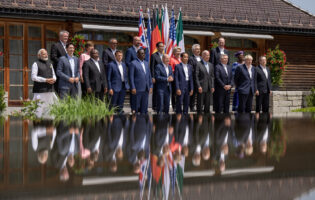Politics of Dilemma – Turkey, Europe, and Syria
On June 22, 2011, the American-German Institute (AGI) hosted a seminar with DAAD/AGI Fellow Rana Deep Islam on “The Politics of Dilemma – Turkish-European Approaches Toward Syria.” The seminar was supported by a generous grant from the German Academic Exchange Service (DAAD).
The idea of Turkey as a “bridge to the Muslim world” is a regular occurrence in the German political discourse. This is especially true for members on the left spectrum of German politics, who frequently mention this in regard to their support for Turkish membership in the EU. While the notion of Turkey providing a “bridge” to the Middle East may seem to be in the best interests of the EU, such an idea, Mr. Islam argued, only makes sense if the policies of Turkey and the EU toward the Arab world are similar. To explore the Middle East policies of both actors, Mr. Islam focused his analysis on their relationship with a key player in the region: Syria.
Syria holds a key strategic position in the Middle East, as both Turkey and the EU have looked to ties with Damascus as a means of increasing their overall presence in this region. Following the rise of the Bashar al-Assad regime in 2000, Syria pursued a policy of rapprochement with the EU and Turkey. In response, the EU aimed to make Syria a principal component of its cooperation with the Mediterranean region. This move also prompted both sides to formulate an association agreement that outlined the EU’s interests in Syria, namely nuclear non-proliferation, curbing support of terrorism, and promoting democracy and human rights. Unfortunately, the agreement was never ratified, as Operation Iraqi Freedom and claims that Syrian security forces had assassinated Lebanese Prime Minister Rafic Hariri soured EU-Syria relations. It was not until 2008 that warmer relations between the two actors were once again sought after. Following appeals by German foreign minister Frank-Walter Steinmeier in 2008, Syria was invited to the Middle East Peace Conference in Annapolis, Maryland. At the direction of French President Nicolas Sarkozy, Syria again became a key piece of the EU’s revised Union of the Mediterranean. This was done with hopes that it could play an integral role alongside the EU in response to any future conflicts in the Middle East or North Africa.
The relationship between Turkey and Syria, as with the EU and Syria, has been characterized by times of conflict. The two states have struggled over claims pertaining to the Hatay province, a region in Turkey to which Syria claims historic bonds, as well as water shares of the Tigris and Euphrates basin. Turkey also suspected Syrian support for the Kurdistan Workers’ Party (PKK), a fact which almost brought the two states to war. However, despite these disagreements, Turkish-Syrian relations still embody a “prime example of bilateral conflict resolution,” according to Mr. Islam. Part of this conflict resolution stems from Turkey’s “zero-problem policy,” which focuses on limiting tensions with any neighbor states. For Turkey and Syria, this came in the form of a free-trade zone, a visa-free mobility agreement, and a high-level strategic cooperation. On the other hand, it is the deep emotional tie between Syria and Turkey that has allowed the two states to resolve some of their issues, an idea which is exemplified in President Recep Tayyip Erdoğan’s claims of Syria as a “state of brothers.” In this sense, the Turkish-Syrian relationship comes at a much deeper level than that of the EU.
Whatever the reasons used to describe their relationships with Syria are, both the EU and Turkey now find themselves at an impasse with Syria over the regime’s handling of the ongoing civilian protest. Syria will now act as a litmus test for both Turkey and EU crisis management in the Arab world. While it has been much more difficult for Turkey to publicly condemn the Assad regime’s actions toward protestors, in contrast, the EU was much more willing to condemn this course of action in Syria. Looking forward, no matter how the situation in Syria will evolve, both actors will consider Syria to be of critical importance to the future development of the Middle East, i.e., marginalizing the presence of Iran, the Israeli-Palestinian conflict, the territorial integrity of Lebanon, or the fight against international terrorism. In reaching these collective aims, both the EU and Turkey realize that it begins with the stability of Syria. For this reason, Mr. Islam argued that Ankara and Brussels can no longer afford to ignore each other when it comes to dealing with Syria. While Turkey’s voice may carry more weight than the EU’s in a Muslim country like Syria, the EU possesses strong instruments for aiding the people of Syria, as well as its eventual stabilization process. Therefore, with such crucial common goals in mind, Turkey and the European Union must find common ground on Syrian policy with relative haste.







